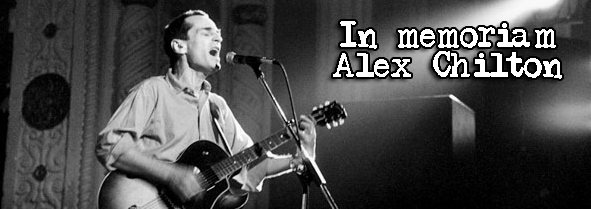brent johnson looks at the career of indie icon alex chilton

One of the random things I love in life are the small, short-lived, often-unheralded eras in music history. Sure, we know about the British Invasion, disco and grunge. But I adore early-70s glam rock, 1980s college rock and the Britpop movement that briefly swept over England.
Then, there’s power-pop, a tiny movement in the early 1970s when bands played songs with soaring choruses and unabashedly catchy melodies over chiming power chords. Badfinger, the Raspberries — those were the power-poppers with the biggest hits.
But Big Star was the best of them. And this week, the power-pop movement lost one of its pioneers: Alex Chilton.
Chilton — an indie-music icon who died Wednesday of a heart attack — was Big Star’s leader. And even if you didn’t know that, you’ve heard his music. If only because because he started his career as the teenage lead singer of The Box Tops, the American 1960s pop group that hit the top of the charts with ‘The Letter,’ now a gritty AM-radio classic:
[youtube=http://www.youtube.com/watch?v=wD9mCp8SifM]
But a few years later, Chilton formed Big Star with fellow singer-songwriter Chris Bell. Taking a cue from early Beatle records, they played infectious songs with little experimental embellishment. It was about the song, the song, the song. The song was the most important part of the band. And Chilton wrote some amazing ones.
One of them — the gorgeous ‘The Ballad Of El Goodo’ — was found on Big Star’s 1972 debut, #1 Record:
[youtube=http://www.youtube.com/watch?v=Cn1t6l7UUPc]
(Note: Chilton also went through one of the biggest voice changes in music. The raspy, older-than-his-years voice on ‘The Letter’ was replaced by a clear falsetto by the time he formed Big Star.)
Like The Velvet Underground’s self-titled first album, #1 Record didn’t sell much. But it’s become an underground classic. (Another famous tune on the album was actually a Chris Bell song, ‘In The Street,’ which many people know as the theme to That 70s Show — only that version is a cover by fellow power-poppers Cheap Trick, played over the show’s opening credits.)
Bell left the band after the first album. And that made Big Star’s sophomore record, 1974’s Radio City, an all-Chilton affair. And out of it came their most enduring song, the majestic ‘September Gurls’:
[youtube=http://www.youtube.com/watch?v=BNKSs1J38EA]
Big Star made one more record, 1978’s bizarre Third/Sister Lovers — one track was a Christmas song called ‘Jesus Christ.’ And Chilton went into obscurity for years.
Power-pop was also short-lived. But its influence was potent — inspiring many bands to play pop music with a rock bent, and vice-versa. Think Tom Petty, Cheap Trick, the Posies — and especially the mid-1990s alt-rock movement, where big choruses and guitar songs were all over the radio.
Big Star — which Chilton reformed and toured with recently, even releasing a new album a few years ago — actually had the least amount of commercial success among the 1970s power-poppers, but their legacy is the strongest. They’re the kind of band that music snobs love — and people who despise music snobs will love, too.
The Replacements, the great 1980s college rock group, even wrote a song about Chilton — simply called ‘Alex Chilton’:
[youtube=http://www.youtube.com/watch?v=sTSJYZyouek]
It’s true: You may not know Alex Chilton’s songs, but you’ll fall in love with them. I did.


Very good article.